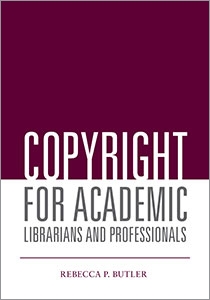Primary tabs
You don't need to be an ALA Member to purchase from the ALA Store, but you'll be asked to create an online account/profile during checkout to proceed. This Web Account is for both Members and non-Members. Note that your ALA Member discount will be applied at the final step of the checkout process.
If you are Tax-Exempt, please verify that your account is currently set up as exempt before placing your order, as our new fulfillment center will need current documentation. Learn how to verify here.
- Description
- Table of Contents
- About the author
- Reviews
In her new book, seasoned copyright expert Butler turns her attention to one of the complex arenas in the world of copyright and intellectual freedom: the unique environment of higher education. This practical handbook will show students training to become college and university librarians how to make informed decisions regarding the use and availability of print, non-print, and online resources. Based on Butler's 17 years of experience conducting copyright workshops and courses, her book matches real-world scenarios with interpretations of the law from copyright experts in the field to provide a thorough understanding of current, everyday applications of copyright law in higher education. Beginning with a solid grounding in the underlying principles of copyright law, such as fair use, public domain, permissions, plagiarism, documentation and licenses, Creative Commons, Open Source (OS), and Open Access (OS), Butler moves on to specific applications of copyright law, including:
- Internet resources such as blogs/vlogs, podcasts, wikis, social networking tools, and more
- DVDs, television, and streaming and on-demand video
- Computer and gaming software, handheld applications, and mobile technologies
- CDs, music, and audio
- Multimedia and print works
Butler explains fair use, public domain, documentation and licenses, permissions, creation and ownership, violations and penalties, international copyright law, and avoiding copyright problems as they relate to each of these formats. A separate chapter covers the use of each format in distance learning, as well as how the Digital Millennium Copyright Act (DMCA) and the Technology, Education, and Copyright Harmonization (TEACH) Act relate to and affect the many aspects of distance education. A clear and comprehensive textbook for copyright courses, this book features figures and decision flowcharts throughout that make the concepts presented easy to follow and understand. Appendices feature pertinent sections of U.S. copyright law and a helpful glossary of terms.
Contents
List of Figures
Preface
Acknowledgments
Part I: Copyright Fundamentals
1. Introduction to Copyright Law
2. Fair Use
3. Public Domain
4. Obtaining Permission
5. Other Important Copyright Information
Part II: Specific Applications of Copyright Law
6. The Internet and Copyright Law
7. DVDs, Video Streaming, On Demand, and Copyright Law
8. Television and Copyright Law
9. Computer Software, Handheld Applications and Mobile Technologies, and Copyright Law
10. Music and Copyright Law
11. Multimedia and Copyright Law
12. Print Works and Copyright Law
13. Distance Learning and Copyright Law
14. Conclusion
Appendix A: Selected Sections of the U.S. Copyright Law
Appendix B: Glossary for Chapter 6
Index
Rebecca P. Butler
Rebecca P. Butler is a Presidential Teaching Professor in the Department of Educational Technology, Research, and Assessment, College of Education, at Northern Illinois University (NIU) in DeKalb, Illinois. At NIU, she teaches graduate (master's and doctoral) students in school library media and instructional technology. Prior to moving to NIU in 1998, she was an assistant professor in the Department of Curriculum and Instruction at East Tennessee State University (ETSU). While a faculty member at NIU and ETSU, she has conducted a variety of workshops, conferences, and graduate classes on the topic of copyright. Although the majority has been geared for K-12 teachers and school librarians, she has also done numerous presentations on the subject for university faculty and staff; public, medical, museum, and other librarians; technology coordinators; and more.Dr. Butler has written numerous articles and columns on copyright, for a number of library and technology professional journals, including: Knowledge Quest, the journal of the American Association of School Librarians; TechTrends, the journal of the Association of Educational Communications and Technology; School Libraries Worldwide, the journal of the International Association of School Librarians; and Library Trends, a library and information science journal. She has written two other copyright books, both published by Neal-Schuman, Copyright for Teachers and Librarians (2004) and Smart Copyright Compliance for Schools: A How-To-Do-It Manual (2009). In addition, she has served as a reviewer (2006) for the Laura Bush 21st Century Librarian Program.
"An excellent resource that deserves to be in every professional library. It would be particularly useful in units that deal with electronic reserves, photocopy services, media services, and institutional repositories."
— Catholic Library World
"The question and answer format works very well in this book and permits the reader to see how sometimes copyright law is not a black and white area. It is particularly helpful in the sections that discuss newer technologies ... Those interested in copyright law would benefit from adding this book to their collection, and it is also an excellent reference resource for those library professionals whose duties include offering advice and guidance on copyright issues. It is comprehensive while remaining accessible to readers."
— Technicalities
"Butler's contribution to the select works on copyright in academic libraries provides unique content, both in terms of presentation and substance. This is a handy desk reference for those of us who are not frequent readers of material on copyright but are, nonetheless, responsible for administering copyright compliance at some level. The splendid flowcharts allow you to move much more quickly through the steps of a copyright analysis. Butler addresses cutting-edge topics for libraries like mobile technologies and multimedia formats at lending institutions. She also provides guidance at the international level, which is rare in the U.S. litera¬ture on copyright in libraries or academic institutions."
— Law Library Journal



